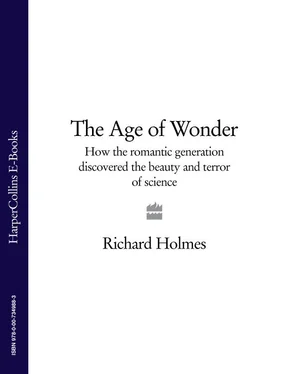Not far away was another mystery: a huge wicker man constructed of basketwork, evidently for some obscure sacrificial rite. ‘The whole was neatly coverd with feathers, white to represent skin and black to represent hair and tattow. On the head were three protuberances which we should have calld horns but the Indians calld them tata ete, little men. The image was calld by them Maúwe; they said it was the only one of the kind in Otahite and readily attempted to explain its use. But their language was totaly unintelligible and seemed to referr to some customs to which we are perfect strangers.’
By the time of their return to Fort Venus on 1 July, Cook had completed a beautiful and lucid chart of the island, the figure of eight with its ‘marshy isthmus’ at the join, which would serve European mariners for generations to come, a model of clarity and accuracy. Banks had hugely increased his supply of botanical specimens, and his knowledge of the fruit and animal resources of the island. But the human mystery of Tahiti had deepened. Its history, customs, religious practices, sexual rites all challenged European understanding, and demanded a new science of explanation.
One of the most puzzling and disturbing of all the ceremonies that Banks witnessed was the tattooing of a young girl’s buttocks. Tattooing was universal in Tahiti, and its function among young male warriors was self-evident. Complex patterns were worked across the legs, the upper torso, on the fingers and ankles, and around the loins: proof of a young man’s courage, and also of his place in the social hierarchy. The skin was pierced with a block of sharpened wooden pins, and impregnated with a purple-black vegetable dye mixed with coconut oil. The operation was long and exquisitely painful, usually performed in stages over several months, and was itself a form of male initiation rite.
Banks could understand all this very well. What he could not understand was why women were forced to undergo it also, moreover at a cruelly young age. Was it a form of sexual initiation? Or purely decorative? Or a form of tribal identity marking? Tahitian women decorated themselves with flowers, and wore beautiful mother-of-pearl earrings, of which Banks made an entire collection. But they used very little other decorations or jewellery.
5 July 1769. This morn I saw the operation of Tattowing the buttocks performed upon a girl of about 12 years old. It proved as I have always suspected a most painfull one. It was done with a large instrument about 2 inches long containing about 30 teeth, every stroke of this hundreds of which were made in a minute drew blood. The patient bore this for about 1/4 of an hour with most stoical resolution; by that time however the pain began to operate too stron[g]ly to be peacably endured. She began to complain and soon burst out into loud lamentations and would fain have persuaded the operator to cease. She was however held down by two women who sometimes scolded, sometimes beat, and at others coaxed her.
Banks became more and more restless as this operation proceeded. ‘I was setting in the adjacent house with Tomio for an hour, all which time it lasted and was not finishd when I went away, tho very near. This was one side only of her buttocks for the other had been done some time before. The arches upon the loins upon which they value themselves much were not yet done, the doing of which they told caused more pain than what I had seen.’
Finally he could stand it no more, and went back alone to Fort Venus. He was clearly both disturbed and fascinated by the whole procedure, though he gives little away about his deeper feelings-whether he was repulsed or shocked, or even sexually excited. He later wrote: ‘For this Custom they give no reason, but that they were taught it by their forefathers…So essential is it esteemed to Beauty, and so disgraceful is the want of it esteemed, that every one submits to it.’ 51
On 3 July Banks made one last expedition into the interior, this time accompanied only by the surgeon Monkhouse. His choice of companion seems to have been deliberate. They pursued a river line up into the mountains, pressing on as far as they could go, painfully clambering up the riverbed, sweating and stumbling, searching for plants and minerals. On the way Banks concluded rightly that Tahiti must be volcanic in origin, ‘a volcano which now no longer burns’; which also explained the fact that the Tahitian god was known as ‘the Father of Earthquakes’.
Twelve miles inland, further than any previous expedition had ever penetrated, they were brought to an abrupt halt by an enormous and beautiful waterfall, surrounded by ‘truly dreadful’ cliffs more than a hundred feet high. Beneath it lay ‘a pool so deep that the Indians said we could not go beyond it’. Here, in this enchanted but faintly menacing place, the secret heart of the Tahitian island, it seems the two men bathed and talked together, until European rivalries were happily forgotten. 52
After a stay of three months, the British expedition prepared to leave in the second week of July 1769. Banks spent a whole day sowing South American fruit seeds for the Tahitians to harvest after they were gone: lemons, limes, watermelons, oranges. While he loaded his final specimens of Tahitian plants and animals aboard, he considered the possibility of taking a human representative of Paradise back to England. The matter had been raised with Tupia, the wise priest, who proposed that he himself should make the perilous journey together with his young son: ‘This morn Tupia came on board, he had renewed his resolves of going with us to England, a circumstance which gives me much satisfaction. He is certainly a most proper man, well born, chief Tahowa or priest of this Island, consequently skilld in the mysteries of their religion. But what makes him more than any thing else desireable is his experience in the navigation of these people and knowledge of the Islands in these seas. He has told us the names of above 70, the most of which he has himself been at.’ 53
Although Tupia was evidently enthusiastic to make the journey, Captain Cook would not underwrite the decision. He did not feel that the Tahitian could be signed on as an official member of the expedition, and he thought that once he was in England the Admiralty and the Crown would ‘in all human probability’ refuse to support him financially. Banks had no such hesitations, and resolved to be responsible for both Tupia’s welfare and his upkeep, saying he was taking on Tupia as his friend and his guest. Cook agreed, and would find Tupia’s help as the expedition’s South Seas navigator and Polynesian translator invaluable.
Banks added a comment that seems extraordinarily revealing. He suddenly thinks of outdoing his fashionable country-house friends back in Yorkshire with their exotic pets. ‘I do not know why I may not keep [Tupia] as a curiosity, as well as some of my neighbours do lions and tygers, at a larger expence than he will probably ever put me to.’ The idea that his friend and adviser could have been considered, even for a moment, as a ‘curiosity’, or a wild animal specimen, comes as a shock. It shows that Banks, for all his sympathy and humanity, could easily revert to his role as Linnaean collector and wealthy European landowner on a jaunt among the natives. However one explains it, the remark hangs uneasily in the air, never quite dissipated, never quite forgotten: the snake in the garden.
Nonetheless, Banks closed this entry on a more typically generous note: ‘The amusement I shall have in [Tupia’s] future conversation, and the benefit he will be of to this ship, as well as what he may be if another should be sent into these seas, will I think fully repay me.’ 54
There was a last-minute drama when, as Fort Venus was being dismantled, two of the marines slipped away into the woods, having said they had beautiful Tahitian wives, were content to resign His Majesty’s service, and intended to stay. Cook sent out a tracking party, but also took native hostages, which caused a good deal of ill-feeling. Once again it was Banks who defused a potentially ugly situation, by agreeing to spend the last night onshore with his Tahitian friends, until the marines should return. ‘At day break a large number of people gatherd about the fort many of them with weapons; we were intirely without defences so I made the best I could of it by going out among them. They wer[e] very civil and shewd much fear as they have done of me upon all occasions, probably because I never shewd the least of them, but have upon all our quarrels gone immediately into the thickest of them. They told me that our people would soon return.’
Читать дальше












